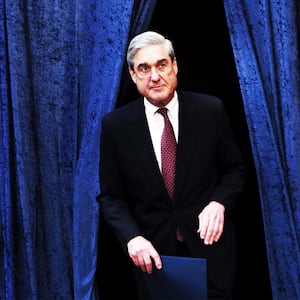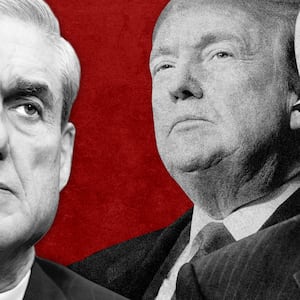He lost me at “no collusion.”
I have been withholding judgment on Attorney General William Barr, believing that someone who has previously served in the Department of Justice as he did would respect the institution and the rule of law. His conduct before and after his confirmation had provided some reason to question his motives, but I still held out hope that he would lead honorably in handling the investigation of Special Counsel Robert Mueller.
Barr confirmed my worst suspicions when he stood at the podium to discuss the release of Mueller’s report into Russian election interference. Instead of using the language of a prosecutor, Barr parroted President Donald Trump’s favorite talking point of “no collusion” four times. And it got worse from there.
Mueller’s report specifically stated that he was not using the term “collusion” because “collusion is not a specific offense or theory of liability” nor a “term of art” used in federal law. Instead, Mueller stated that his team analyzed the facts under the law of conspiracy. For Barr to repeatedly use the term “collusion” when Mueller deliberately avoided it gave the appearance that Barr had coordinated his message with the White House. Barr seemed more like a defense attorney for Trump than the lawyer for the people.
Moreover, during his remarks, Barr diverged from the language of the report in other ways. The report stated that “the investigation did not establish” conspiracy. Instead, Barr said that the special counsel “found no evidence” that any American participated in the conspiracy to interfere with the election. These are two very different things. In fact, Mueller seemed to anticipate that some might misread his findings, including in his report the following language: “A statement that the investigation did not establish particular facts does not mean there was no evidence of those facts.” He likely did not expect the person to misconstrue his findings would be the attorney general of the United States.
Barr then went on.
“In assessing the President’s actions discussed in the report, it is important to bear in mind the context. President Trump faced an unprecedented situation. As he entered into office, and sought to perform his responsibilities as President, federal agents and prosecutors were scrutinizing his conduct before and after taking office, and the conduct of some of his associates. At the same time, there was relentless speculation in the news media about the President’s personal culpability. Yet, as he said from the beginning, there was in fact no collusion. And as the Special Counsel’s report acknowledges, there is substantial evidence to show that the President was frustrated and angered by a sincere belief that the investigation was undermining his presidency, propelled by his political opponents, and fueled by illegal leaks.”
A motive of frustration or anger does not excuse obstruction of justice. In fact, most defendants who commit obstruction of justice experience frustration and anger. These motives are not exonerating, and Barr’s reference to them sounds like the kinds of excuses you might hear from a lawyer representing the accused.
Perhaps the most egregious remark that Barr made during the press conference made was when he said that the White House “fully cooperated” in the investigation. Barr made this statement despite the fact that Trump refused to participate in an interview with Mueller, something Mueller’s team sought for a year. Mueller’s report noted the problems that resulted from allowing Trump to respond to written questions, responding more than 30 times that he did not recall the answer. Trump’s failure to sit for an interview prevented Mueller’s team from asking follow-up questions or attempting to refresh his recollection with documents.
Mueller gave up on the idea of an interview because he believed that Trump would resort to “lengthy constitutional litigation” that would unduly delay the investigation. The report also shows that in addition to refusing to participate in an interview, Trump engaged in obstructive behavior throughout the investigation, attempting to fire Mueller, editing a press release in a misleading way, directing White House Counsel Don McGahn to lie, and seven other episodes of obstructive behavior. That hardly sounds like full cooperation.
If Barr’s language is not enough to tarnish his legacy, then his conduct certainly is. Barr’s March 24 letter to Congress stated that Mueller’s inability to decide the obstruction of justice issue “leaves it to the Attorney General to determine whether the conduct described in the report constitutes a crime.” We learned yesterday that the report contains no indication that Mueller intended for Barr to decide the obstruction issue.
Mueller stated that he followed the DOJ opinion that a sitting president cannot be indicted, and so “fairness counseled against concluding that President Trump committed crimes because he could not avail himself of the normal adversary process for public name-clearing before an impartial adjudicator.”
In other words, Mueller was refraining from recommending charges against Trump because he is the president, not for lack of evidence. Mueller further stated that he decided to “preserve the evidence when memories were fresh and documentary materials were available,” suggesting that he was leaving the decision to pursue charges to Congress or to prosecutors in a time when Trump is no longer president. By substituting his view for that of the special counsel, Barr circumvented the very purpose for having a special counsel, to insulate the decision-maker from conflicts of interest that exist for those in the executive branch chain of command.
We had a warning about Barr last summer, before he was attorney general, when he submitted an unsolicited 19-page memo to the Justice Department arguing that a president cannot obstruct justice as a matter of law when he is exercising executive power. Mueller and his team rejected that position in their report, but as attorney general, Barr gets the last word.
When former Attorney General Jeff Sessions recused himself from the Russia investigation, Trump was angry that he did not have a protector. He asked then, “where’s my Roy Cohn,” a mob lawyer who used aggressive and legally questionable tactics to help his clients prevail.
For future presidents, the question may be “where’s my Bill Barr?”








